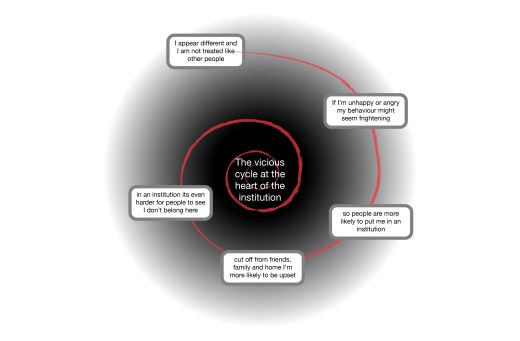Simon Duffy explains why the NHS must embrace personalised support for people with disabilities and complex needs
Author: Simon Duffy
Sometimes we don’t really want to be in control. When we are very poorly or in crisis we may need others to take the lead, until we are able to take back control. Sometimes we may even rely on others too much, we may become institutionalised, passive or inactive. How we work with health and social care services can make a big difference to whether we flourish or survive.
However, putting aside the most acute kinds of healthcare, once we are on the path to recovery, managing a chronic illness or even coming to the end of life, then how we control our life, and direct any support that we receive, is critical. This is something disabled people have communicated clearly for decades: people do not want placements, care homes, respite or day centres; people want to be part of the community, living a life of meaning, free to do things that make most sense to them. This is not just right, it is a human right, as set out in the UN Convention of Rights for Persons with Disabilities.
The ultimate goal of a good social and health care system is to enable our citizenship. Health is far too narrow a measure of success: it is not just that we live, it is how we live that matters. People with disabilities, mental health problems or chronic illnesses can live rich and fulfilling lives, lives of contribution and creativity, if they are given the opportunity to live as equal citizens.
This is where personalised support comes in. Just because you need assistance or some kind of ongoing care doesn’t mean you can’t lead a full life, but that assistance needs to focus on your life, not just your disability or your illness. If we fail to provide personalised support then we will not only reduce the quality of someone’s life we can easily drive people into self-injurious or dangerous behaviour.
It is clear that the ongoing use of private hospitals (at great cost and with little benefit) for people with learning disabilities is closely connected to a lack of personalised support. Flexible support is not provided early enough and current support solutions often lead to frustration and anger. If people respond with anger then services often respond with punishment and further institutionalisation. This quickly becomes a vicious circle.

Figure - Vicious cycle at the heart of the institution
Personalised support not only stops this problem, it is the only just and sustainable way of supporting people who currently find themselves institutionalised like this.
Sadly it seems that personalised support is far from universal. With support from NHS England, the Centre for Welfare Reform and Choice Support established an international survey to discover what were the main components of personalised support, and we concluded that genuine personalised support was organised as follows:
Although the survey included many organisations known for the high quality of their work, few claimed to be working to their utmost across all five areas. Moreover it was clear that many other organisations recognised that they were not currently capable of offering personalised support to this standard. Most support remains standardised and institutional. Too often getting support means being forced to accept the limitations that come with the current support system. This is a breach of human rights.
Why have we come to accept this? Partly this may be explained by the ongoing prejudice facing disabled people and people with chronic illness. If we do not value them or expect their contribution then we will not organise ourselves to look for value or contribution. But there are also structural barriers. For example, many organisations report that commissioning and funding systems are not organised to enable flexible and personalised support.
It may also be that the ongoing philosophy of competition, rather than collaboration, has played a part in slowing progress. Many organisations want to provide personalised support, but they don’t know how. We have created a competitive environment which discourages people from sharing their learning. For this reason we have recently launched Citizen Network. Our goal is to create an international movement to advance citizenship for all, and one practical step we can make is to help those willing to learn to learn from each other.
It might also be useful for the NHS to think hard about its own practices, both as direct providers of assistance and as funders or commissioners. If personalised support is weak then it needs to be intentionally strengthened, as it has been recently in Devon. This cannot be done with competitive procurement practices - more developmental approaches are required.
You can read more about personalised support in the report Progress on Personalised Support. You can also read and share the practical guide A New Way Home which sets out how to design and develop support on a human rights basis for people leaving institutional care.
Also, please join Citizen Network, it is free to join as an individual or as a group. Citizen Network will be working with NHS England in the coming months to create events where we can explore how to make the practical progress needed to move toward personalised support.
The publisher is the Centre for Welfare Reform.
NHS Must Get Behind Personalised Support © Simon Duffy 2017.
All Rights Reserved. No part of this paper may be reproduced in any form without permission from the publisher except for the quotation of brief passages in reviews.
health & healthcare, Personalised Support, social care, Article